Suchergebnisse für "Factsheet: Energietechnologien gestalten, die für alle sinnvoll und nutzbar sind"
Oekosan 09 - International symposium for high-quality energetic renovation of large-scale buildings
From October 7 to 9, 2009 the AEE INTEC has organized an international symposium "Ökosan 09". The emphasis of the symposium was the communication of (partial) results of running and closed cooperation projects by leading technical experts dealing with the retrofit of large-scale buildings.
EM Städte - Monitoring and evaluation of urban energy flows
In the first phase of the project, the data source of the energy statistics will be analyzed. Based on the findings of the analysis a methodology on build up regional energy balances will be developed. The methodology will be integrated into the Senflusk tool and tested on five reference cities in Austria.
Cities as innovation drivers
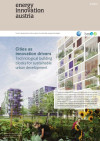
Technological building blocks for sustainable urban development
energy innovation austria
4/2013
Herausgeber: BMVIT, Klima- und Energiefonds
Englisch, 8 Seiten
Downloads zur Publikation
Building innovations from Austria in the Arab world
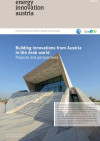
Projects and perspectives
energy innovation austria
3/2014
Herausgeber: BMVIT and Klima- und Energiefonds
Englisch, 8 Seiten
Downloads zur Publikation
Active Buildings
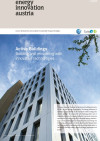
Building and renovating with innovative technologies
energy innovation austria
1/2013
Herausgeber: BMVIT & Klima- und Energiefonds
Englisch, 8 Seiten
Downloads zur Publikation
EnergieAudioAkademie - Development and usage of audiofiles for the training of professionals from the building sector
Important issues in building energy efficiency will be prepared as audio files. The target groups are builders and plumbers. The files complement existing training and educational programs and will be disseminated via CDs and/or USB sticks to the target groups via craftsmen networks and an internet platform.
Energy-Sponge: The Building as an Energy-Sponge - Electricity In - Heat Out
Innovative, dynamic control concepts had been developed which enable (air) heat pumps in combination with PV- or renewable grid electricity to use the building mass of a multi-familiy house as heat storage. User acceptance had been evaluated and possible business models had been developed.
Connection of innovative strategies and technologies to a holistic, resources-friendly plus energy building (FUTUREbase)
On the basis of a construction project in Giefinggasse 4 in Vienna the combination of new, innovative strategies and technologies to an integrated, resources conserving plus energy building with high signaling and multiplication effect had been tested for feasibility. A regional, energetical bond between the buildings TECHbase, ENERGYbase and the Klima-Windkanal had been developed.
Urban Future
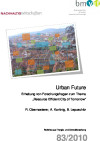
Erhebung von Forschungsfragen zum Thema "Resource Efficient City of Tomorrow"
Schriftenreihe
83/2010
R. Obernosterer, A. Karitnig, B. Lepuschitz Berichte aus Energie- und Umweltforschung 83/
Herausgeber: BMVIT
Deutsch, 195 Seiten
Downloads zur Publikation
CellPor - cellulose polymerized - new methods for the processing of a polymer-cellulose-foam according to ecological criteria in construction
The development of a spray applicable cellulose composite as insulating material on the basis of renewable resources, combined by the development of a prototype for the spray-on technology for processing the new, water free cellulose composite are the demanding challenges of this project.
Marktreifes Plus-Energie-Büro
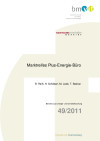
Schriftenreihe
49/2011
B. Reiß, H. Schöberl, M. Leeb, T. Bednar Berichte aus Energie- und Umweltforschung 49/
Herausgeber: BMVIT
Deutsch, 164 Seiten
Downloads zur Publikation
REC-Businesspark - Investigation of the first Austrian renewable energy community business and industrial park
In the course of the project, the conceptual design of a zero-emission or plus-energy business park in Weiz with a focus on photovoltaics and fuel cells in combination with a Renewable Energy Community (E-EGe) had been carried out. By establishing the park on a "greenfield", all structures can be created according to the requirements of the E-EGe.
New Standards for Old Houses. Sustainable Renovation Concepts for Houses on Estates Built Between the Wars and Post-War

The many housing estates of detached houses in Austria built in the times of economic crisis between the wars and post-war as part of publicly funded housing programmes are the starting point for this research project. The aim is to offer detailed guidelines with basic planning principles for the renovation of these housing estates with detached houses, aiming to reach the standard of a low-energy house or a passive house.
Innovative moth-protection system for sheepwool insulation

This project developed a novel "bio-pesticide"-formula by screening plant extracts and minerals for their strong repellant activity in order to protect sheepwool insulation from cloth moth infestation. It was investigated and examined by state-of-the-art-technology that the anti-moth-mixture extracted from plants and minerals, acts as a valid alternative to existing pest control agents.
Pilot project gaining-building-land Pongau
Gaining extra space for additional households through sustainable renovation and/or extension of 8 detached houses by integrating consulting, planning, energy efficiency concepts and financing.
Contracting as a instrument for renovation

Development of contracting models for comprehensive renovation service packages.
Reallabor 100% renewable energy Waldviertel
Under the motto "Always one step ahead", the aim is to develop a content-related and economic implementation concept for a "Reallabor 100% erneuerbare Energie Waldviertel".
IEA SHC, Task Solar Thermal Plants with Advance Thermal Storage Technologies for Low Energy Buildings

Participation in TASK 32 "Storage concepts for solar buildings". Subtask leader of the subtask for heat storage based on phase change materials
aspern Vienna´s Urban Lakeside - subproject 3a: Technology Centre aspern IQ
The demonstration project "Technology centre aspern IQ" showed that the energy required for space conditioning (heating, cooling, ventilation, lighting, hot water) can be covered from domestic energy production.
ENUMIS - Energetic effects of urban manufacturing in the city
The project examines the challenges of urban manufacturing (UM) from the energy perspective and shows opportunities arising from the implementation of UM concepts for the future design of sustainable energy systems for cities.
